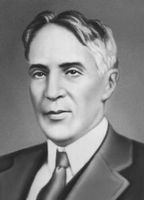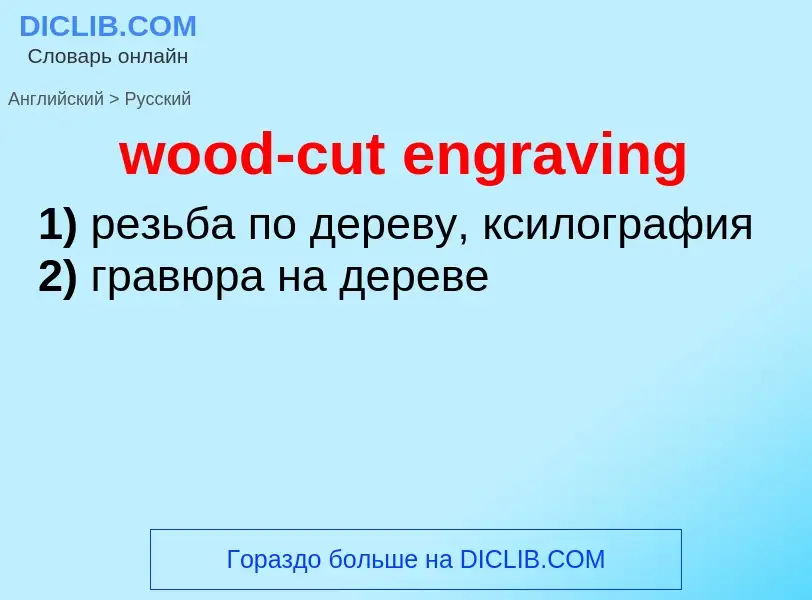Traduction et analyse de mots par intelligence artificielle ChatGPT
Sur cette page, vous pouvez obtenir une analyse détaillée d'un mot ou d'une phrase, réalisée à l'aide de la meilleure technologie d'intelligence artificielle à ce jour:
- comment le mot est utilisé
- fréquence d'utilisation
- il est utilisé plus souvent dans le discours oral ou écrit
- options de traduction de mots
- exemples d'utilisation (plusieurs phrases avec traduction)
- étymologie
wood-cut engraving - traduction vers russe
['wudingreivə]
общая лексика
гравёр по дереву
энтомология
жук-топограф
жук-древоточец (Xyleborus spp.)
Définition

Wikipédia

Wood engraving is a printmaking technique, in which an artist works an image into a block of wood. Functionally a variety of woodcut, it uses relief printing, where the artist applies ink to the face of the block and prints using relatively low pressure. By contrast, ordinary engraving, like etching, uses a metal plate for the matrix, and is printed by the intaglio method, where the ink fills the valleys, the removed areas. As a result, the blocks for wood engravings deteriorate less quickly than the copper plates of engravings, and have a distinctive white-on-black character.
Thomas Bewick developed the wood engraving technique in Great Britain at the end of the 18th century. His work differed from earlier woodcuts in two key ways. First, rather than using woodcarving tools such as knives, Bewick used an engraver's burin (graver). With this, he could create thin delicate lines, often creating large dark areas in the composition. Second, wood engraving traditionally uses the wood's end grain—while the older technique used the softer side grain. The resulting increased hardness and durability facilitated more detailed images.
Wood-engraved blocks could be used on conventional printing presses, which were going through rapid mechanical improvements during the first quarter of the 19th century. The blocks were made the same height as, and composited alongside, movable type in page layouts—so printers could produce thousands of copies of illustrated pages with almost no deterioration. The combination of this new wood engraving method and mechanized printing drove a rapid expansion of illustrations in the 19th century. Further, advances in stereotype let wood-engravings be reproduced onto metal, where they could be mass-produced for sale to printers.
By the mid-19th century, many wood engravings rivaled copperplate engravings. Wood engraving was used to great effect by 19th-century artists such as Edward Calvert, and its heyday lasted until the early and mid-20th century when remarkable achievements were made by Eric Gill, Eric Ravilious, Tirzah Garwood and others. Though less used now, the technique is still prized in the early 21st century as a high-quality specialist technique of book illustration, and is promoted, for example, by the Society of Wood Engravers, who hold an annual exhibition in London and other British venues.


![Garb and weapons of the [[Ku Klux Klan in Southern Illinois]], August 1875, photo made into a wood engraving.<ref>“Illinois Outlawry," ‘’The St. Louis Republican,’’ August 23, 1875, page 5</ref> Garb and weapons of the [[Ku Klux Klan in Southern Illinois]], August 1875, photo made into a wood engraving.<ref>“Illinois Outlawry," ‘’The St. Louis Republican,’’ August 23, 1875, page 5</ref>](https://commons.wikimedia.org/wiki/Special:FilePath/1875.08.23Prophet1A copy.jpg?width=200)
![''The [[Tench]]'', ''[[A History of British Fishes]]'' (1835), by [[William Yarrell]] ''The [[Tench]]'', ''[[A History of British Fishes]]'' (1835), by [[William Yarrell]]](https://commons.wikimedia.org/wiki/Special:FilePath/A history of British fishes (Page 328) BHL32072987 (cropped).jpg?width=200)

![Example of a 16th-century woodcut, ''[[Dürer's Rhinoceros]]'', by [[Albrecht Dürer]], 1515 Example of a 16th-century woodcut, ''[[Dürer's Rhinoceros]]'', by [[Albrecht Dürer]], 1515](https://commons.wikimedia.org/wiki/Special:FilePath/The Rhinoceros (NGA 1964.8.697) enhanced.png?width=200)
![burin]]s), used in wood engraving burin]]s), used in wood engraving](https://commons.wikimedia.org/wiki/Special:FilePath/Wood Engraving Equipment.jpg?width=200)



